Silver cousin’s undeniable courage
THE call to arms in war-time tends to bring out the very best in people.
William Walker Silver was one of those countless brave men.
Heroic deeds, heart-breaking loss, dreadful suffering during and long after the conflict ends are all part of conflicts that cut short millions of lives.
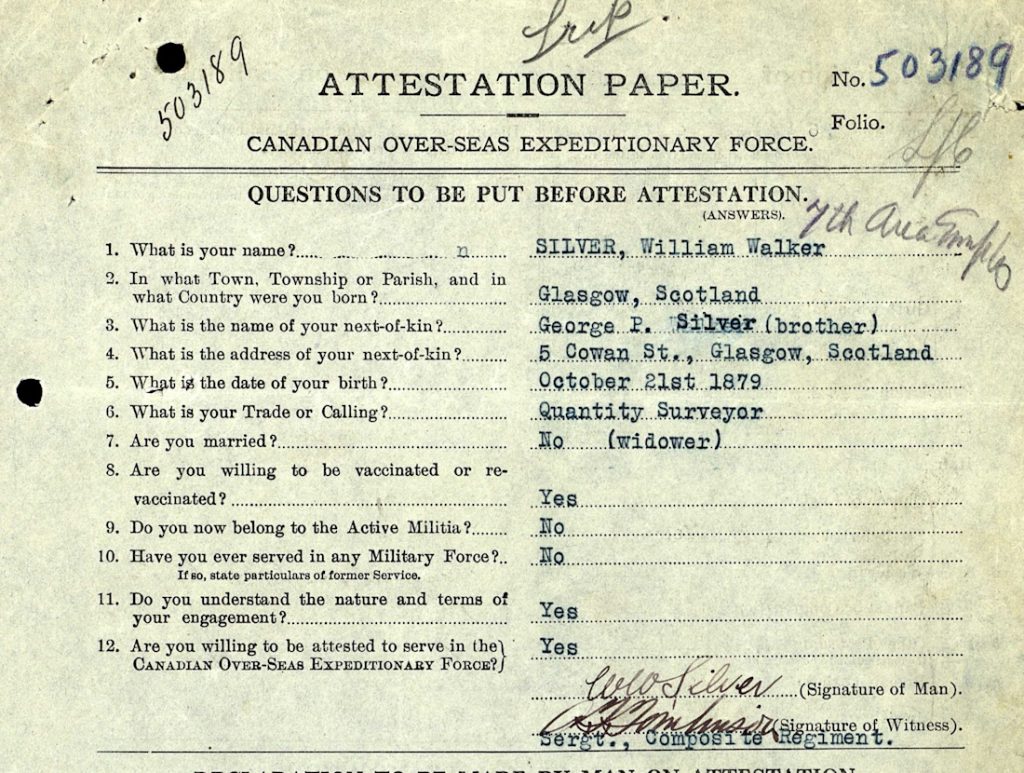
Note that his birth year is recorded as 1879 when, in fact, it was 1876. Also, as far as can be established, he was not a widower.

William Walker Silver’s birth entry.
World War 1 was an horrendous and pointless event which impacted families across the globe. William Walker Silver’s little family was just one of them.
Born in Glasgow, Scotland in 1876, he was named for his father who was a “teacher of phonography”.
That means he was expert in shorthand. No surprise then that William’s younger brother was named George Pitman Silver after Sir Isaac Pitman.
I still have my Pitman’s shorthand textbook. I never did really master that skill though.
But back to William Walker Silver who grew up in gritty Glasgow in a blended family that included two older half sisters, Margaret and Elizabeth, and brothers George and Abiel.
Both Margaret and Elizabeth took the Silver surname and it seems possible that William senior was their biological father.
A distant cousin connection
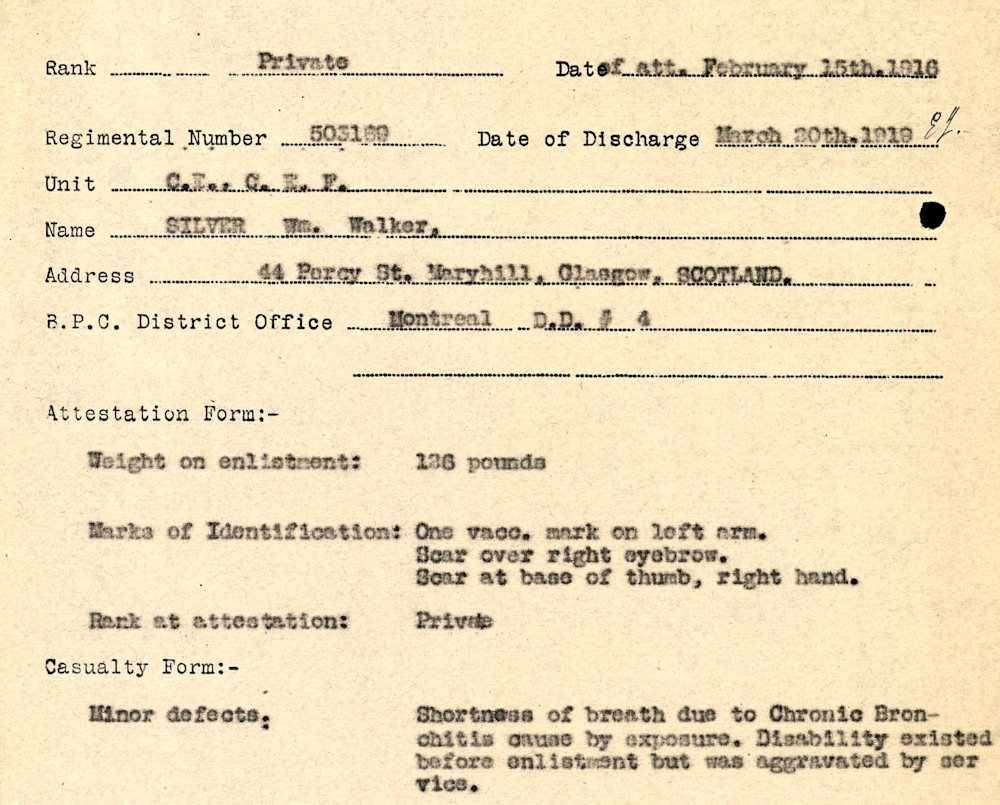
Interestingly, William Walker Silver’s health problems don’t fit the stated description of “minor defects”. He died within weeks of this document being issued.
My interest in William Walker Silver is because of a family connection as a second cousin, three times removed.
In other words, he and my maternal great grandfather James Silver were second cousins.
That also means that William’s grandfather George Silver and James’ grandfather John Silver were brothers.
William senior died in 1883 from a bronchial condition aged only 60. William junior was just seven.
On the 1891 census, the family is at 132 W Graham St, Glasgow. Betsy Silver is a widow aged 50 and four of her children are with her; Lizzie is 17, William 14, George 10 and Abiel 8.
In 1901, they were at 37 Bank St, Glasgow: Elizabeth (Betsy), is 60, Elizabeth (Lizzie) is 26, William is 24, George is 20 and Abiel is 18
The family seems to have survived well as, by the time of the 1911 census, Lizzie, aged 37, is single and a commercial bookkeeper; William, aged 34 is also single and a “measurer in building construction” (a quantity surveyor); and George, aged 30, single, is a company secretary in a law firm.
Abiel, aged 28, had gone to Ireland and was working as a shop assistant in a Belfast drapery.
The war and much change
In the following years the family would be much changed as were countless others the world over, chiefly by the war.
In May 1913, aged 37, William Silver, a surveyor, born in Scotland, arrived in Quebec, Canada from Glasgow aboard the S.S. Grampian.
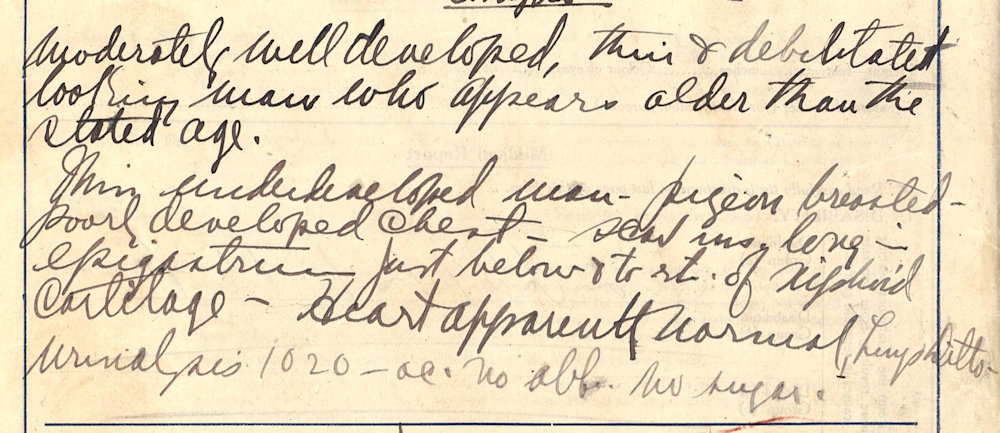
An hand-written entry from Private William Walker Silver’s military records.
On the passenger manifest, it states he intended to work as a surveyor in Winnipeg, Canada.
It is presumed he remained in Canada until 1916 although no other record is yet found to confirm that but it best explains why William Walker Silver came to Montreal and enlisted in the Canadian Overseas Expeditionary Force in 1916.
He presented himself as being aged 36 as his attestation paper shows. He was passed fit to serve.
He had no Canadian address which suggests he may have left his job to join up.
His military record has at least one other interesting entry as he also is listed as a widower.
However, no marriage record can be found for him before 1916, either in Canada or Scotland.
He did eventually marry; in Glasgow, Scotland, in October 1918 to Elizabeth Macgregor, aged 37.
That marriage certificate describes him as a bachelor.
In his military record, his physical description and medical notes show he was a small man in poor health.
He was 5ft 4 1/2ins (162.5cm) high, had black hair and dark brown eyes.
Sad picture of an ailing man
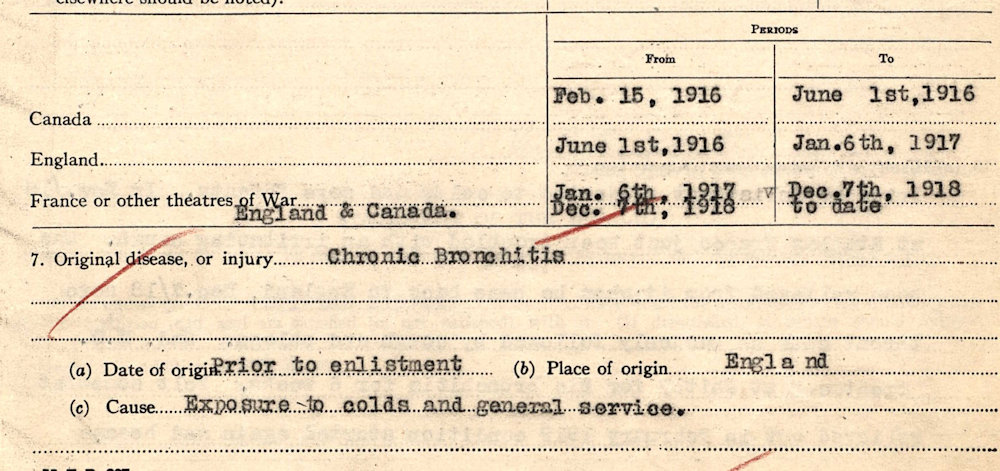
Telling observation about his health.
Over the three years and 27 days he served in the 12th Field Company, Canadian Engineers, No 503189 Private William Walker Silver’s health deteriorated as is borne out by the various notes including:
“Moderately well developed, thin and debilitated looking man who appears older than stated age.”
“This underdeveloped man _ pigeon breasted _ poorly developed chest…”
“Enlisted 15 Feb 1916 Montreal. In France 23 months. Had contusion right foot 31-12-17 to 26-1-18.”
“Prior to enlistment subjected to colds and sore throats. In Nov 18 at Etaples France … troubled with an irritating cough.”
“Dec 7/18 sore throat came on suddenly followed by cough and phlegm.”
“Partial loss of function of respiratory system from bronchitis..”
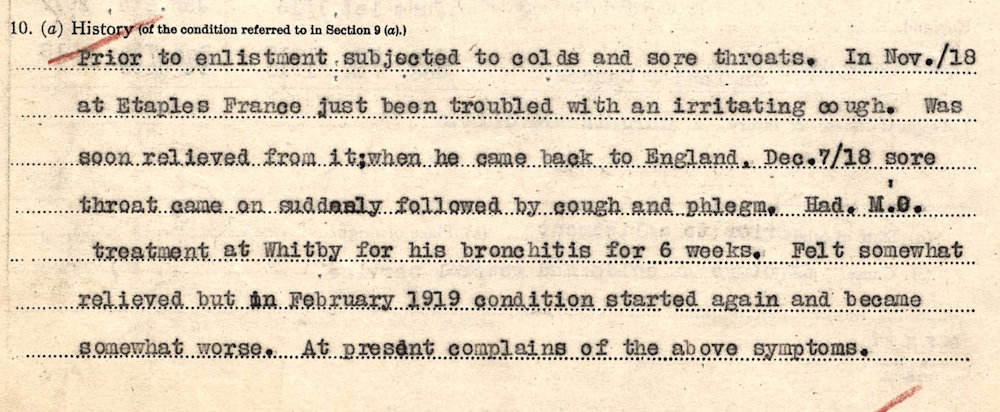
Details of William Walker Silver’s health struggles.
“Flat and poorly developed chest. Expansion very poor. No impaired resonance with the exception of moist rales heard over both base of the lungs.”
“Subjected to frequent coughs especially when lying down. Expectorates phlegm.”
“Measles, scarlet fever, whooping cough and convulsions during childhood. Abscess over his chest at age of 22. German measles at 26 years. Malarial fever 1895-1898.”
How did he catch malaria?
Malaria is not exclusively a tropical disease I was surprised to find, so even though William Walker Silver had never left his homeland before 1913, he was one of those rare cases recorded in Scotland.
It seems that William Walker Silver’s continuing bronchial condition may have made him susceptible to illness. Among them were measles, scarlet fever, whooping cough, and German measles as an adult. The young man was plagued by various ailments.
Despite those hardships, William made himself available to serve Canada and saw action in France.
His main injury was a crushed big toe on his right foot which must have been serious because he spent time in hospital.

A crushed toe.
With hostilities over, he was granted extended leave in 1918, as well as permission to marry; which he did on 21 October, to Elizabeth Macgregor in Glasgow.
We are left to guess how he became acquainted with Elizabeth given he moved to Canada in 1913 and joined up there in 1916.
Presumably they were known to one another before he left Glasgow and remained in contact.
Little chance to build a life
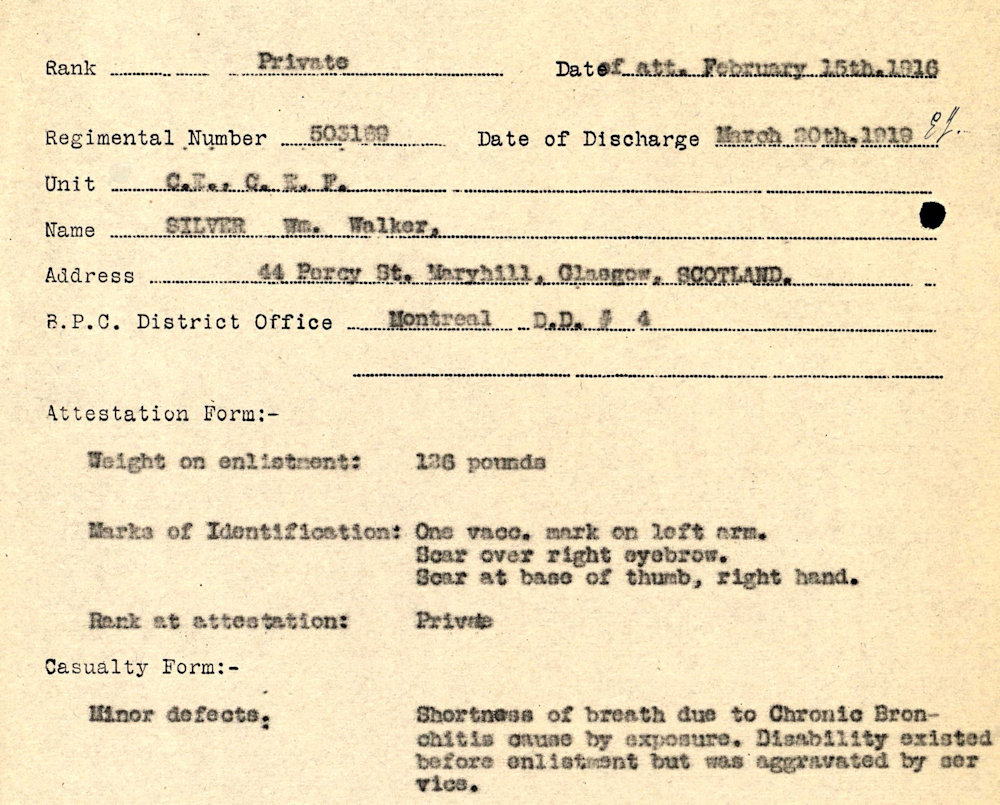
William Walker Silver’s discharge certificate.
He could not have had much time with his new bride as he was sent back to his unit on 4 December 1918 and stationed in Whitby, Yorkshire, England.
There’s no record of him having leave after this time and, eventually, he was sent back to Montreal where he was discharged on 20 March 1919.
William Walker Silver was obviously deathly sick at the time.
This entry from his discharge papers makes that clear: “Shortness of breath due to Chronic Bronchitis caused by exposure. Disability existed before enlistment but was aggravated by service.”
He died 39 days later, still in Montreal, on Monday, April 28.
He never got to see his wife and family again back in Glasgow. William Walker Silver’s life was one of hard work and struggle with poor health.
However, he stood up for a principal, left his homeland but still fought under another nation’s flag … and should be rightly remembered for his courageous and selfless contribution to humanity.
